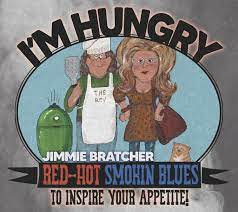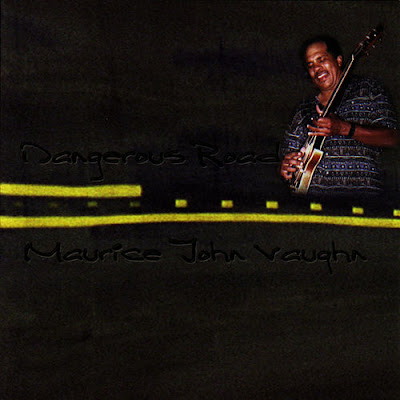(1) Maurice John Vaughan
Dangerous Road
Blue Suit-116D
1- Talking to Each Other With the Music/ 2 - Dangerous Road/ 3- Two Can Play That Game/ 4- Love Abuse / 5- Mama, She Believed in Me/ 6- In the Midnight Hour/ 7- Stop and Take a Drink/ 8- I Don’t Care/ 9- Lady in the Box/ 10- The Pigeon/ 11- Shoo Fly Shoo/ 12- The Telephone’s Running My Life/ 13- I Can’t Stand Being Alone. 51:41
Maurice John Vaughn, g, s, c; B.J. Emery, tbn, v-4, 7; Ilaria Lantieri, b, v-9, 13; Massimo Bertagna, d- 1, 4, 8, 9, 11, 12, 13; Fred Brousse, g -2, 5, 6, 7, hca -1, 10; Jerome Moho, d- 2, 3, 5, 6, 7,10; Khouki Pontelero, or - 2, 6, 7, 10, p-1, 5; Detroit Junior, p. 8, 11, 12; Allen Batts, or 4, 12; Velvet McNair, v - 4, 7, 13. Milan, Italy & Chicago Il.
(2) Jimmy Johnson & Luther Johnson Jr
Ma Bea’s Rock
Storyville STCD 8050
So Many Roads -1/ Crosscut Saw -1/ Ma Bea’s Rock -1/ Feel So Bad -2/ I Believe My Time Ain’t long -3/ All Your Love -3/ You Gotta Have Soul -3/ My Own Fault -1/ Get Ready Here I Come -1/ Same Old Blues -1/ Got Mind to Travel -3/ Can You Use a Man Like Me -3/ I Got To Be Crazy -3/ Got papers on You Baby -3. 62:18.
-1 Jimmy Johnson v, g; Jimmy Dawkins, g; Sylvester Boines, b; Tyrone Centuray, d. October 15, 1975, Chicago IL.
-2 same as -1 but Andrew ‘Big Voice’ Odom, v. October 15, 1975, Chicago IL.
-3 Luther Johnson Jr, v, g; Willie James Lyons, g; Willie Kent, b; Tyrone Centuray, d. October 17, 1975.
While he has been producing and playing on a variety of recordings the past few years, (1) is Maurice John Vaughan’s first album since his 1993 Alligator album Shadow of the City. Recorded in Italy and Chicago, Dangerous Road displays his soulful mellow baritone, guitar, and saxophone in a variety of blues and soul/funk settings. Along with trombonist B.J. Emery, he is aided by pianist Detroit Junior on three tracks along with other guests elsewhere. In the liner notes, David Whiteis describes Vaughan an “aggressive innovator” as an ironic comment on the title of Vaughan’s self-produced debut album, Generic Blues. Some might dispute calling him an innovator, but his strength is that he is a very good performer. He writes thoughtful original blues such as “Love Abuse” and “I Don’t Care,” knows how to deliver a lyric and he plays thoughtfully, and his solos are full of surprises. His saxophone soloing is particularly noteworthy as he avoids honks and overblowing that one award winning sax player employs to excess. Equally intriguing are the funk numbers such as “Lady in the Box” which incorporates clever Italian repartee from bassist Ilaria Lantieri. However, the reworking of Wilson Pickett’s “Midnight Hour” is pleasant at best, with the rhythm section not as hard-hitting as might have been hoped. Vaughan is not one to hit you over the head with musical cliches. It may take some listening to this disc to appreciate its pleasures, but it will be worth the effort.

(2) is another in Storyville’s reissues of a series of recordings made at various Chicago clubs in the mid-seventies and which first appeared on the French MCM label. Despite being club recordings, they usually were recorded in the afternoon, often minimizing any club ambience. Additionally, the recordings have somewhat dull sound and would have benefitted from more skillful engineering. This writer at one time possessed the original vinyl album of this disc and remembers it as among the better ones in the MCM series. It was among the first LPs to spotlight Jimmy Johnson and Luther Johnson Jr. The original eight songs (the first eight titles) are augmented by two additional Jimmy Johnson performances and four by Luther Johnson Jr. For those familiar with the two artists, there will be few surprises. Their basic approaches have not changed, although they have honed and refined their styles.
Jimmy Johnson is heard on covers of songs associated with Otis Rush (“So Many Roads), Albert King (“Crosscut Saw”) and B.B. King (“Its My Own Fault”) displaying his stinging guitar and his tenor that cuts through to the listener’s gut. Some composer credits are sometimes mangled as Johnson is wrongly credited as composer of the Temptations hit, “Get Ready,” perhaps his weakest performance. At the time of the recording, Johnson was in Jimmy Dawkins’ Band which provides functional backing. Dawkins’ own guitar is featured on the title cut, a medium tempo instrumental, and behind Voice Odom on Chuck Willis “Feel So Bad.”
Luther Johnson Jr. was an important part of Muddy Waters Band at the time of his recording, which are solid performances in the West Side Chicago blues vein. He opens with a rippling instrumental homage to Elmore James on “I Believe,” on which he emulates Elmore’s broomdusting slide guitar without (I believe) using a slide. Luther follows with Magic Sam’s “All Your Love,” and then launches into the funky “You Gotta Have Soul.”. The late Willie James Lyons on second guitar and Willie Kent on bass lay down a nice foundation, although Tyrone Centuray’s wooden drumming adds little. The new Luther Johnson tracks are quite nice to have available. “I Got To Be Crazy” is a powerful adaptation of a fine George ‘Wild Child’ Butler lyric. Despite the quality of the music, the sound quality will probably deter more casual listeners who might want to check out the more recent recordings by both. Fans of either will certainly enjoy this disc.
This is a review I wrote for Cadence in 2001. As was customary, full discographical information was provided although I do not remember what 'c' was for Maurice John Vaughan. The s was for saxophone and g for guitar. I should have had v for vocals there as well. I likely received my review copies from the publication. I have made only minor changes to punctuation. Both may still be available although the cover for Ma Bea's Rock is from a later Storyville reissue.


























